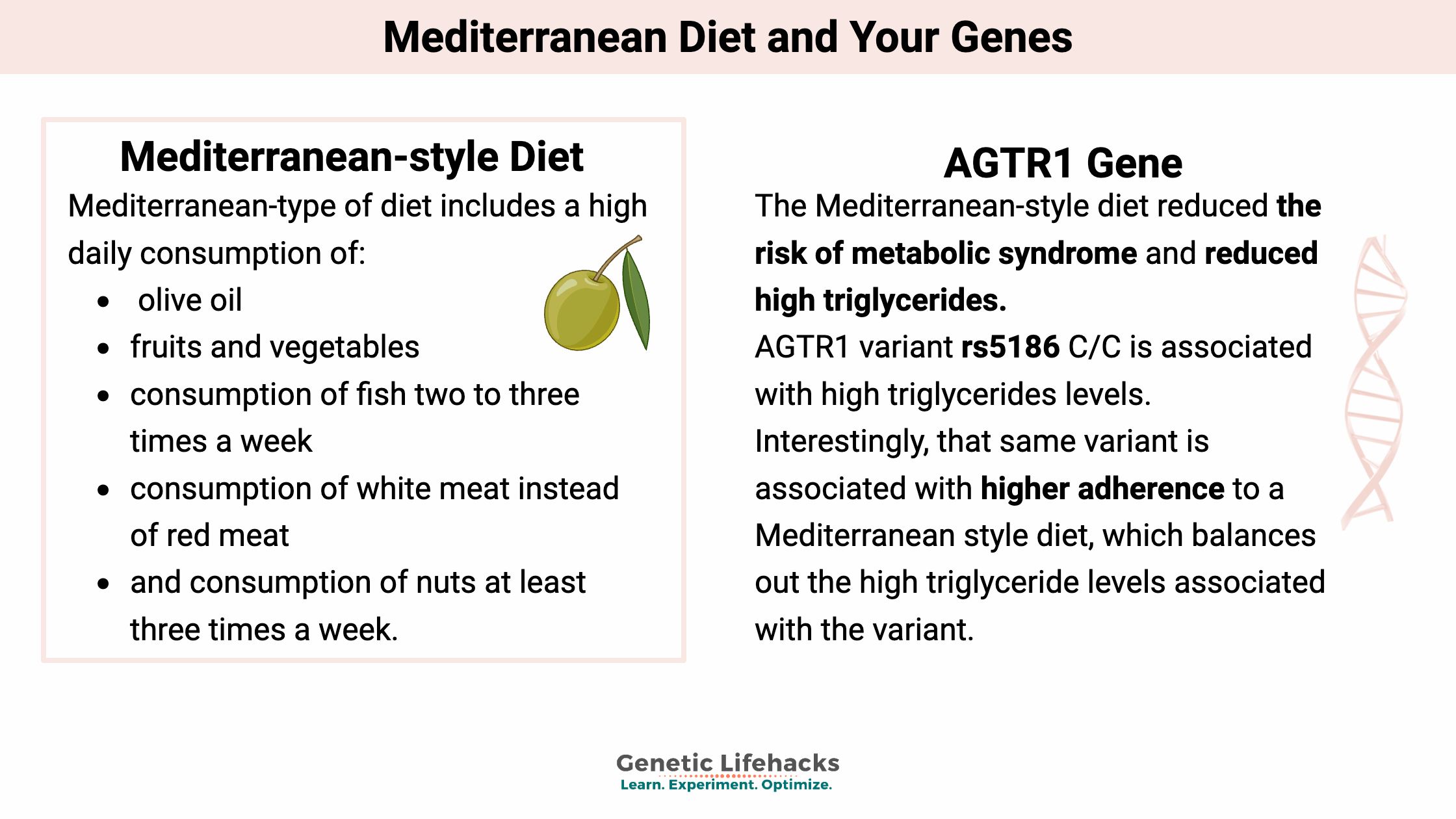Have you ever wondered how a person’s genes make a difference in the individual body’s response to dietary choices? Some people are excellent at breaking down dietary carbohydrates; others are champs at converting carrots into vitamin A.
But a recent study pointed out not only an interaction between genes and diet – but an interesting way of how genetics may influence the type of diet we choose.
Do your genes influence your dietary choices?
The study looked at interactions between a genetic variant in the angiotensin II gene and dietary choices in Croatia.[ref] The country of Croatia lies along the Mediterranean Sea on the southern coast of Europe. Some of the population eats a Mediterranean-style diet, while others eat a Continental or more traditional European-style diet. It makes for a unique opportunity to study the health effects of the Mediterranean-style diet.
First, let’s look at how the researchers define each diet type. From the study: “The Mediterranean-type of diet included a proportionally high daily consumption of olive oil, fruits, and vegetables, consumption of fish two to three times a week, consumption of white meat instead of red meat, and consumption of nuts at least three times a week.”
“The Continental diet included high consumption of red meat and meat products, small quantities of fruits and vegetables, and rare consumption of fish without olive oil. The diet that included the elements of Mediterranean-type and Continental-type of diet was categorized as a mixed-type of diet.”
The study participants (n=528) were split pretty evenly, with half having metabolic syndrome and half without metabolic syndrome. Metabolic syndrome is a catch-all term that means the participants had at least three conditions: high blood pressure, high blood sugar, excess body fat around the waist, high triglycerides, and abnormal cholesterol levels.
In other studies, the Mediterranean-style diet reduced the risk of metabolic syndrome and reduced high triglycerides.
Researchers looked at the interaction with the angiotensin II gene involved in both lipogenesis (creation of triglycerides) and the creation of fat cells (adipogenesis). Additionally, variants of this gene are associated with high blood pressure. The variant they sequenced for this study was rs5186.
In this Croatian population, those carrying the risk allele were at a higher risk for high triglycerides. But the researchers also found that those carrying the risk allele were about twice as likely to have chosen to normally eat a Mediterranean-style diet.
So you have a two-way interaction: A risk allele that usually causes higher triglyceride levels and a natural tendency to go with a diet that will lower triglycerides. Balanced. Amazing how you can instinctively know what diet works best for you.
Another study also showed an interaction with the CETP gene and lower HDL cholesterol on a Mediterranean diet. Individuals with the CETP variant (in the genotype report below) had a more significant increase in their HDL cholesterol and decrease in their triglycerides after a year on a Mediterranean-style diet compared to a year on a low-fat diet. The Mediterranean style diet included 22% monounsaturated fat (MUFA) while the low-fat diet included only 12% MUFA.[ref]
Mediterranean diet: Genotype Report
Access this content:
An active subscription is required to access this content.
Lifehacks:
Access this content:
An active subscription is required to access this content.
Related Articles and Topics:
Do you carry the Hunter-Gatherer or the Farmer Genetic Variant
References:
Andrews, Julie. “Mediterranean Grain Bowls with Salmon.” The Healthy Epicurean, 8 May 2016, https://thehealthyepicurean.com/mediterranean-grain-bowls-with-salmon/.
Božina, T., et al. “Can the Choice of Diet Undermine the Potential Genetic Risk of AT1R 1166A>C Gene Polymorphism?” Gene, vol. 679, Dec. 2018, pp. 291–96. PubMed, https://doi.org/10.1016/j.gene.2018.09.004.
Wang, W. Y., et al. “Association of Angiotensin II Type 1 Receptor Gene Polymorphism with Essential Hypertension.” Clinical Genetics, vol. 51, no. 1, Jan. 1997, pp. 31–34. PubMed, https://doi.org/10.1111/j.1399-0004.1997.tb02410.x.

